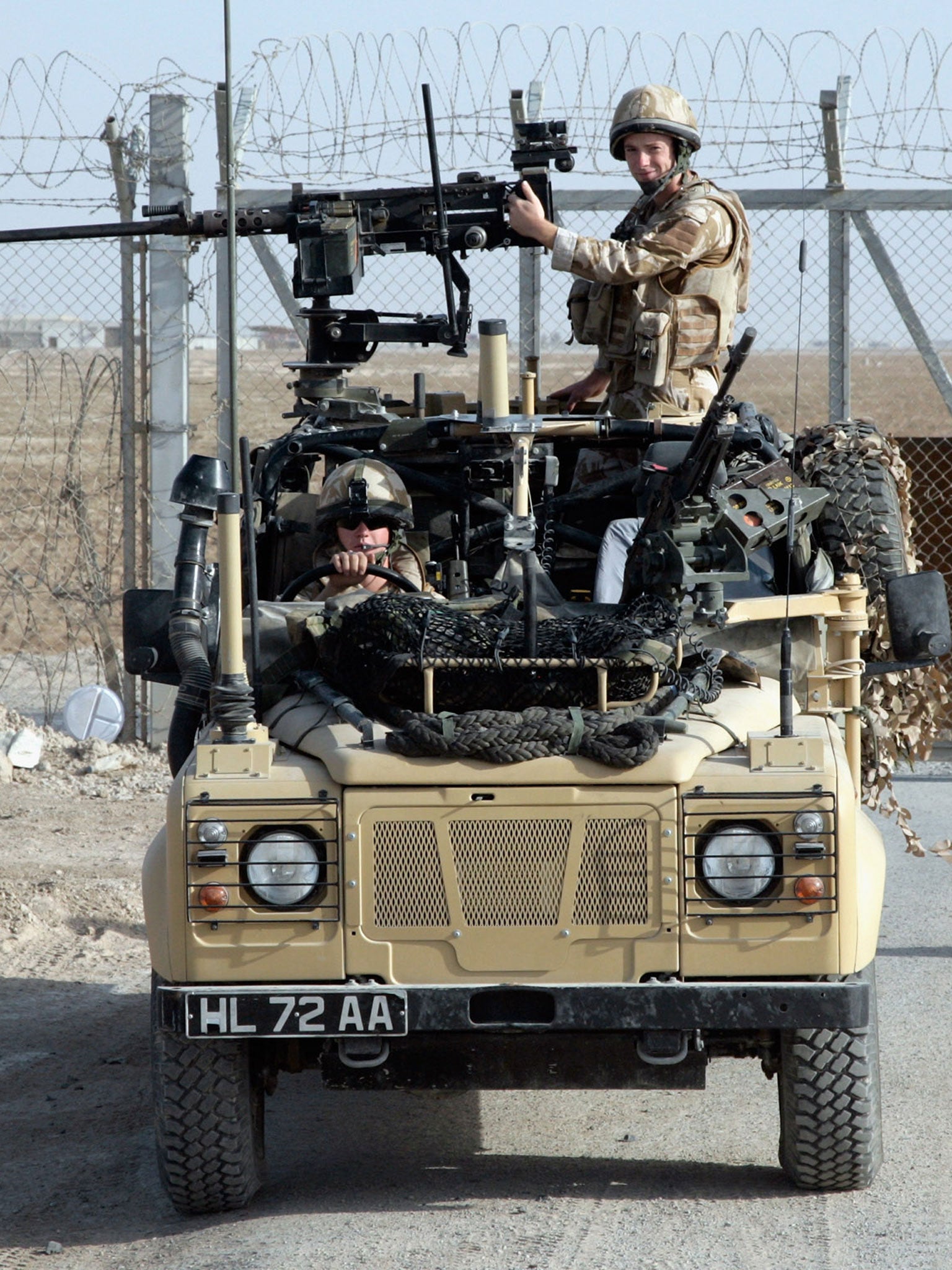Troops’ right to life same as civilians, court told
Snatch Land Rovers were withdrawn from combat zones because they were so vulnerable

Your support helps us to tell the story
From reproductive rights to climate change to Big Tech, The Independent is on the ground when the story is developing. Whether it's investigating the financials of Elon Musk's pro-Trump PAC or producing our latest documentary, 'The A Word', which shines a light on the American women fighting for reproductive rights, we know how important it is to parse out the facts from the messaging.
At such a critical moment in US history, we need reporters on the ground. Your donation allows us to keep sending journalists to speak to both sides of the story.
The Independent is trusted by Americans across the entire political spectrum. And unlike many other quality news outlets, we choose not to lock Americans out of our reporting and analysis with paywalls. We believe quality journalism should be available to everyone, paid for by those who can afford it.
Your support makes all the difference.A soldier in a war zone has the same right to have his life protected as a civilian caught up in combat, lawyers for the bereaved families of troops killed in Iraq argued before the highest court in the land today.
Robert Weir, representing the relatives of two young soldiers killed by roadside bombs, insisted that it was a legal anomaly that locals caught in the cross fire of operations were protected by the Human Rights Act – in particular the right to life - but British troops were not.
“It is a topsy turvy world, a world where state agents (soldiers) are so intimately linked to the state that they can bring others in (to the jurisdiction of the act) but for some reason are put in a separate category outside,” said Mr Weir, adding: “Because they are state agents they end up in an inferior position. That can't be right.”
The four-day hearing before seven justices of the Supreme Court is the culmination of a long legal battle by Sue Smith, 51, the mother of Private Phillip Hewett, 21, who was killed in 2005 alongside two other members of the Staffordshire Regiment after an improvised explosive device (IED) hit their Snatch Land Rover, a vehicle so vulnerable to explosions that it would later be withdrawn from the combat zone.
“I will continue this fight. I am not going anywhere even if they try to grind me down. I can't because it is a matter of principle,” Mrs Smith said. “If Phillip had refused to go out in a Snatch he would have been tried at court martial. He went out because it was his job. Yet when he died he did not have the right protection because the Ministry of Defence's attitude is combat immunity means that doesn't matter. I can't see how that can be right.”
Yesterday Mr Weir, arguing for Mrs Smith as well as the family of Private Lee Ellis, 23, of the 2 Battalion, The Parachute Regiment, who was also killed in the Al Amarah area in 2006, said that by virtue of the fact that the soldiers' presence in southern Iraq meant that locals were protected by the European Convention on Human Rights must mean that they themselves fell within its jurisdiction.
“This case is about whether or not there should be a legal obligation to protect our soldiers when we send them to fight,” said Jocelyn Cockburn, Mrs Smith's solicitor. “The MoD are saying there should be no duty at all, not even to equip them properly. They argue the Human Rights Act does not apply at all because soldiers are not within the jurisdiction. They are trying to find a way of explaining how Iraqi civilians are within the jurisdiction when they encounter our soldiers but the soldiers are not.”
In October last year, the Court of Appeal struck out their claim that the MoD was in breach of Article 2 - the right to life, which places a responsibility on the state to offer adequate protection such as suitably armoured vehicles - after an earlier Supreme Court judgement that military personnel did not fall within the jurisdiction the moment they stepped out of a British base on operations.
But last year the European Court of Human Rights ruled in the case of Al-Skeini that Iraqi citizens killed when the British were effectively the occupying force in the south of the country were protected by the European convention.
The MoD is opposing the families' case as well as counter appealing a decision by the Court of Appeal that bereaved families of those killed in a Snatch as well as others caught up in a friendly fire incident could pursue damages claims on the grounds of negligence. They argue that combat immunity applies and it would not be fair, just and reasonable to impose a duty of care on the MoD in such circumstances. Decisions about battlefield equipment are for politicians and military commanders, they add.
Angela Patrick, of the charity Justice, which has intervened in the case, said: “UK armed forces are ordered around the world, wearing the cloak of UK law with them wherever they go. The Government is asking the Supreme Court to rule that there is a human rights shaped hole in that armour.”
She said that UK forces must, like local citizens, be covered by human rights law as “the anomalies created by any other conclusion would be extraordinary”.
Join our commenting forum
Join thought-provoking conversations, follow other Independent readers and see their replies
Comments